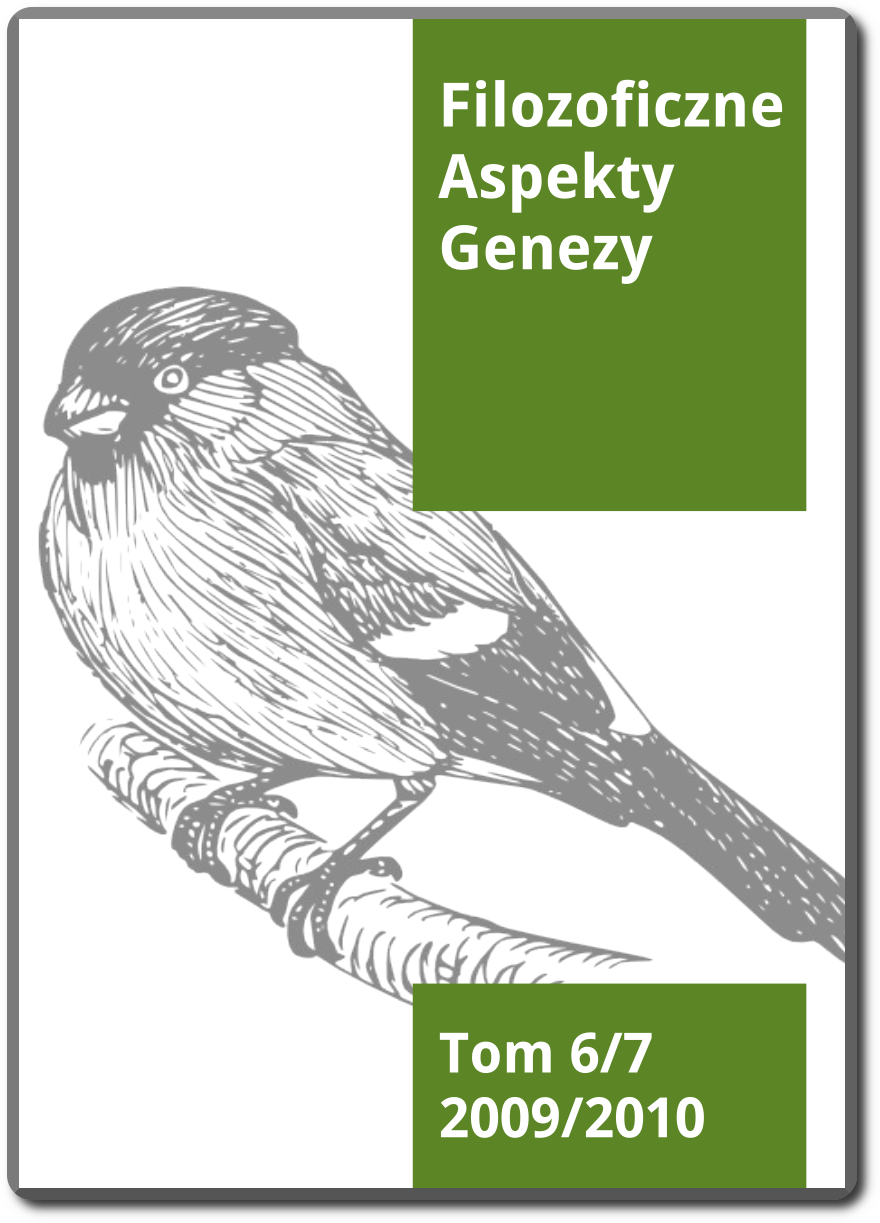Opublikowane 21.05.2021
Słowa kluczowe
- teoria inteligentnego projektu,
- przyczyna inteligentna,
- przyczyna nadnaturalna,
- chrześcjaństwo,
- nauka
- religia,
- naturalizm metodologiczny,
- empiryzm ...More

Utwór dostępny jest na licencji Creative Commons Uznanie autorstwa 4.0 Międzynarodowe.
Jak cytować
Abstrakt
Teoria inteligentnego projektu (ID) jest alternatywną wobec darwinizmu próbą wyjaśnienia genezy życia na Ziemi, głoszącą, że życia nie da się wyjaśnić bez odwołania do inteligentnego projektanta. W zamyśle jej twórców i rzeczników ma to być teoria naukowa. Krytycy zarzucają jednak, że teoria ID mówi o nadnaturalnym projektancie, a więc jest w istocie zawoalowaną formą kreacjonizmu, uważanego za doktrynę religijną. Autor odpowiada na ten zarzut wskazując, że teoria ID przestrzega wymogów naukowości – zwłaszcza naturalizmu metodologicznego oraz empirycznego ugruntowania wniosków – i że nie można zaklasyfikować jej jako odmianę kreacjonizmu, gdyż nie wypowiada się na temat religijnych pytań o sferę nadnaturalną. Teoretycy ID badają obiekty naturalne, posiłkując się wiedzą o skutkach działania istot inteligentnych, jakimi są ludzie. Starają się w ten sposób dociec, czy u źródeł obiektów naturalnych leży działanie inteligentnej przyczyny. Autor przekonuje, że teoria ID nie może rozstrzygać o naturze ewentualnego projektanta takich obiektów, o ile ma respektować granice dociekań naukowych. Na identyfikację projektanta nie pozwalają aktualne świadectwa empiryczne, które według teoretyków ID wskazują tylko na to, że powstanie pewnych struktur biologicznych wymagało udziału bliżej nieokreślonej inteligencji. Wielu rzeczników ID, takich jak Michael Behe czy Phillip Johnson, utożsamia projektanta z Bogiem chrześcijańskim, zastrzegają oni jednak, że nie jest to wniosek wypływający z teorii ID, a jedynie ich osobiste przekonanie. Wskazują ponadto, że teoria ID jest zgodna wieloma światopoglądami, nie tylko z chrześcijańskim, i nie musi nawet zakładać, że projektant jest istotą nadnaturalną.
Downloads
Bibliografia
- Zeznanie Charlesa Thaxtona w sprawie Kitzmiller v. Dover, 400 F. Supp. 2d 707, M. D. Pa. 2005.
- Dembski William A., The Design Revolution, InterVarsity Press, Downers Grove, Illinois 2004.
- Behe Michael J., Czarna skrzynka Darwina. Biochemiczne wyzwanie dla ewolucjonizmu, przeł. Dariusz Sagan, Biblioteka Filozoficznych Aspektów Genezy, t. 4, Wydawnictwo MEGAS, Warszawa 2008.
- Davis Percival and Kenyon Dean H., Of Pandas and People: The Central Question of Biological Origins, Foundation for Thought and Ethics 1993.
- Behe Michael J., „Współczesna hipoteza inteligentnego projektu. Łamanie reguł”, przeł. Dariusz Sagan, Na Początku… 2004, R. 12, nr 7-8 (183-184), s. 244-266, http://www.nauka-a-religia.uz.zgora.pl/index.php?action=tekst&id=40 (20.03.2009).
- Behe Michael J., „Filozoficzne zarzuty stawiane hipotezie inteligentnego projektu: odpowiedź na krytykę”, przeł. Dariusz Sagan, w: Dariusz Sagan, Spór o nieredukowalną złożoność układów biochemicznych, Biblioteka Filozoficznych Aspektów Genezy, t. 5, Wydawnictwo MEGAS, Warszawa 2008, s. 217-232, http://www.nauka-a-religia.uz.zgora.pl/index.php?action=tekst&id=150 (20.03.2009).
- Behe Michael, zeznanie w sprawie Kitzmiller v. Dover, transkrypt z sesji porannej, 17 października 2005.
- Johnson Phillip E., „Intelligent Design in Biology: The Current Situation and Future Prospects”, Think (The Royal Institute of Philosophy), 19 February 2007, http://www.discovery.org/a/3914 (20.03.2009).
- Woodward Thomas, Darwin Strikes Back: Defending the Science of Intelligent Design, Baker Books, Grand Rapids, Michigan 2006.
- Dewolf David K., West John, and Luskin Casey, „Intelligent Design Will Survive Kitzmiller v. Dover”, Montana Law Review, Winter 2007, vol.68, no 7, http://www.discovery.org/scripts/viewDB/filesDB-download.php?command=download&id=1372 (20.03.2009).
- Scott Eugenie C., Evolution vs. Creationism: An Introduction, Greenwood Press, Westport, Connecticut 2004.
- National Academy of Sciences, Science and Creationism: A View From the National Academy of Sciences, 2nd ed., 1999.
- Johnson Phillip E., Sąd nad Darwinem, przeł. Robert Piotrowski, Oficyna Wydawnicza „Vocatio”, Warszawa 1997.
- Scott Eugenie C., „Antievolutionism and Creationism in the United States”, Annual Review of Anthropology 1997, vol. 26.
- National Science Teachers, „Position Statement on the Teaching of Evolution”.
- Pennock Robert T., Intelligent Design Creationism and Its Critics: Philosophical, Theological & Scientific Perspectives, MIT Press – A Bradford Book, Cambridge, Massachusetts 2001.
- Forrest Barbara and Gross Paul R., Creationism’s Trojan Horse: The Wedge of Intelligent Design, Oxford University Press, New York 2004.
- Edwards v. Aguillard, 482 U.S. 578, 592 (1987).
- Luskin Casey, „Intelligent Design (ID) Has Scientific Merit Because It Uses the Scientific Method to Make Its Claims and Infers Design By Testing Its Positive Predictions”, Discovery Institute, 8 September 2008, http://www.discovery.org/a/7051 (20.03.2009).
- Thaxton Charles, „Introduction to Teachers”, w: Dean H. Kenyon and P. William Davis, Biology and Origins, 1987 (materiał nieopublikowany).
- Campbell John Angus, „Why Are We Still Debating Darwinism? Why Not Teach the Controversy?”, w: John Angus CAMPBELL and Stephen C. Meyer (eds.), Darwinism, Design and Public Education, Michigan State University Press, East Lansing 2003.
- Meyer Stephen C., „A Scientific History – and Philosophical Defense – of the Theory of Intelligent Design”, http://www.discovery.org/a/7471 (20.03.2009).
- Agassiz Louis, „An Essay on Classification”, esej opublikowany po raz pierwszy w 1857, http://books.google.com/books?id=QXkLAAAAMAAJ&printsec=frontcover&dq=Louis+Agassiz#PPA83,M1 (20.03.2009).
- Schiller F.C.S., „Darwinism and Design”, w: Humanism: Philosophical Essays, 2nd ed., Macmillan & Co. 1912, przedruk z: Contemporary Review, June 1897.
- Wallace Alfred Russel, „Sir Charles Lyell on Geological Climates the Origin of Species”, w: Charles H. SMITH (ed.), Alfred Russel Wallace: An Anthology of His Shorter Writings, Oxford University Press 1991, s. 33-34.
- Crick Francis H.C., „Molecular Structure of Nucleic Acids: A Structure for Deoxyribose Nucleic Acid”, Nature, 25 April 1953, vol. 171, s.737-738.
- Polanyi Michael, „Life Transcending Physics and Chemistry”, Chemical and Engineering News 1967, vol. 45(35).
- Polanyi Michael, „Life’s Irreducible Structure”, Science, 21 June 1968, vol. 160, s. 1308-1312.
- Yockey Hubert P., „Self-Organization Origin of Life Scenarios and Information Theory”, Journal of Theoretical Biology 1981, vol. 9.
- Schützenberger Marcel P., „Algorithms and Neo-Darwinian Theory”, w: P.S. Moorhead and M.M. Kaplan (eds.), Mathematical Challenges To the Neo-Darwinian Interpretation of Evolution, Wistar Institute's Symposium Monograph No. 5, 1967.
- Hoyle Fred, Evolution from Space (The Omni Lecture), Enslow Publishers 1982.
- Horigan James E., Chance or Design?, Philosophical Library 1979.
- Thaxton Charles, Bradley Walter, and Olsen Roger, The Mystery of Life’s Origin, Lewis & Stanley 1984.
- Witt Jonathan, „Zarys historii powstania naukowej teorii inteligentnego projektu”, przeł. Dariusz Sagan, Na Początku… 2005, R. 13, nr 9-10 (198-199), s. 352-362, http://www.nauka-a-religia.uz.zgora.pl/index.php?action=tekst&id=81(20.03.2009).
- Zeznanie Charlesa Thaxtona w sprawie Kitzmiller v. Dover, 400 F. Supp. 2d 707, M. D. Pa. 2005.
- Scott Eugenie C., „Monkey Business”, The Sciences, New York Academy of Sciences, January/February 1996, vol. 36, no. 1, s. 20-25.
- Moore John A., Science as a Way of Knowing, Harvard University Press 1993.
- Dembski William A. and Wells Jonathan, The Design of Life: Discovering Signs of Intelligence in Biological Systems, Foundation for Thought and Ethics, Dallas 2008.
- Meyer Stephen C., „The Origin of Biological Information and the Higher Taxonomic Categories”, Proceedings of the Biological Society of Washington 2004, vol. 117(2), s. 213- 239.
- Dembski William A., „Introduction”, w: William A. DEMBSKI (ed.), Mere Creation. Science Faith & Intelligent Design, InterVarsity Press, Downers Grove, Illinois 1998.
- National Academy of Sciences, Teaching About Evolution and the Nature of Science, National Academy Press, Washington, D.C. 1998.
- Dewolf David K., West John, Luskin Casey and Witt Jonathan, Traipsing into Evolution: Intelligent Design and the Kitzmiller v. Dover Decision, Discovery Institute Press 2006.
- Kitzmiller v. Dover, 400 F. Supp. 2d 707, M.D. Pa. 2005, transkrypt z sesji porannej, 27 września 2005.
- „The Mystery of Life’s Origin: An Interview with Dr. Charles Thaxton, Part Two”, http://www.idthefuture.com/2008/07/the_mystery_of_lifes_origin_an_1.html (20.03.2009).
- „The Mystery of Life’s Origin: An Interview with Dr. Charles Thaxton, Part One”, http://www.idthefuture.com/2008/07/the_mystery_of_lifes_origin_an.html (20.03.2009).
- „The Theory of Intelligent Design: A Briefing Packet for Educators”, Discovery Institute, 13 November 2007, http://www.discovery.org/scripts/viewDB/filesDB-download.php?command=download&id=1453 (22.03.2009).



